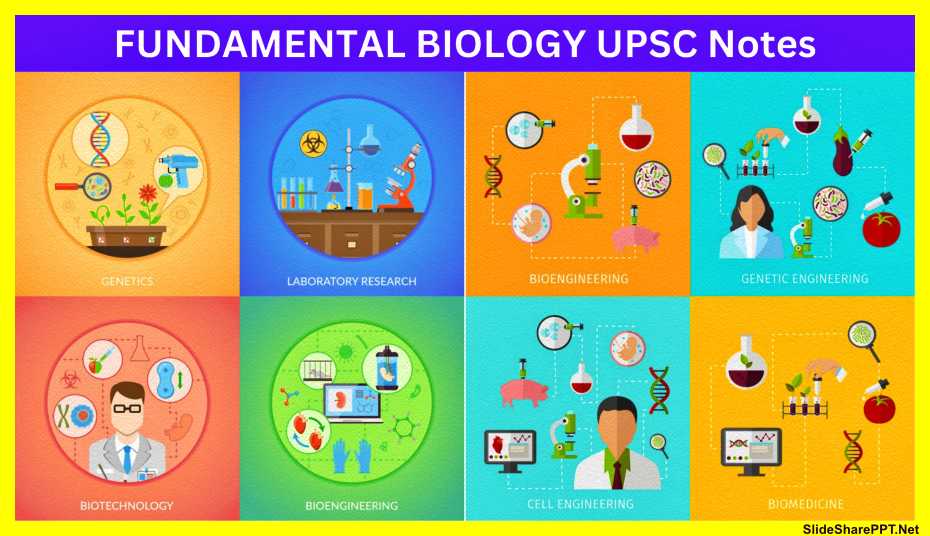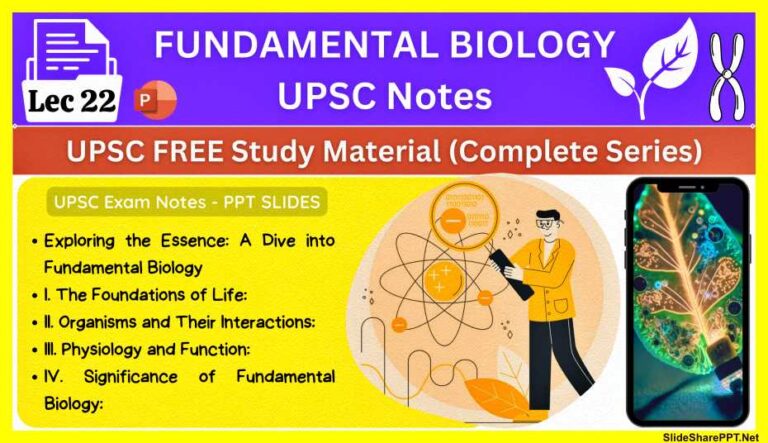FUNDAMENTAL BIOLOGY UPSC Notes
Today we have shared Notes related to FUNDAMENTAL BIOLOGY UPSC Notes PPT, you can download this page as a PDF and a PPT with 1 Click, So these Notes Help you a lot, Read them, and move forward in life.
- In the intricate dance of existence, fundamental biology stands as the maestro, orchestrating the symphony of life. It invites us to peer into the microscopic wonders and grand ecosystems that shape our world, offering a profound exploration of the very essence of living organisms. This journey into the depths of fundamental biology unveils the secrets that govern life, unraveling the intricate threads that weave the fabric of our biological existence. Join us on this expedition as we navigate the complexities and significance of fundamental biology, unlocking the mysteries that define the living world.
FUNDAMENTAL BIOLOGY UPSC Notes – (PPT Lec 22)
Important:-
- If you are viewing this PPT on your phone, please make it full screen and then view it. (Press: 3 dots in PPT, then Full Screen)
- If you have a problem while clicking on next, (Just tap) on the slide instead of clicking Next Botton.
- FOR A BETTER VIEW PRESS Ctrl + Shift + F ON A PC OR LAPTOP.
- Whatever is written in the PPT is different and whatever is written below is different.
- ONE MORE THING – You can read these notes in your Language by pressing the translation button (see Upside, on your right (do not scroll)
👉 ( Download the Complete Google Drive Folder in 1 Click) 👈
(Read this if you are a Teacher)
- If you want to Teach on YouTube, you can use these notes. We will never make any copyright claim nor will we take any money from you, just do not remove our name or website name from these notes and if possible, link it. Please give it in the description.
- You will be given COMPLETE notes that too with (EXPLAINATION + Example). Keep checking this website daily.
- If you have any questions in your mind, you can ask in the comment box. We will try to reply immediately, thank you.
(Read this if you are a Student)
- It is our responsibility to arrange the notes, you should concentrate on your studies.
- You can start studying on YouTube later and first put your 100% in passing the exam.
- If you have any questions in your mind, you can ask in the comment box. We will try to reply immediately. Don’t feel uncomfortable, just comment, we will take care of the rest.
(PLAN-B FOR UPSC STUDENTS)
- Plan B for UPSC students is to teach on YouTube, but you need a complete UPSC PPTs series, and then you can start your teaching journey
- Don’t worry, your brother is still alive. I will provide you with everything – and I mean everything, Just name it in the comment box.
- When you have the PPTs, you can start teaching on YouTube. After a few days, you will become more professional. Then, you can send your resume to UNACADEMY, DRISTI IAS (Hindi), VISION IAS (English), STUDY IQ, BYJU’S, TESTBOOK, ANKIT INSPIRES INDIA (APNI PATHSHALA), and other teaching platforms along with your demo videos or complete playlist (Your YouTube videos). After watching your videos and seeing your dedication and passion for teaching, they may offer you opportunities such as UPSC teaching jobs, UPSC notes-making faculty positions, etc.
- So, this is the magic of these PPTs. (Do not underestimate them).
- Seize this opportunity before your mindset shifts and the fire within you fades, or you’ll find yourself exactly where you are now.
- Once you download it, you can customize it according to your needs, and utilize your talent. Start your journey NOW! That’s it.
- 1 PPT consists of approximately 50 slides, and the Google Drive folder contains 160+ PPTs.
- If you prepare a PPT by yourself then it will take you 160 days to make 160 PPTs i.e. about 6 months, and if you prepare a PPT in 2 days then it will take you 1 year to make 160 PPTs. Think about it once.
- Where is the link? Here it is. (COMPLETE PPT SERIES).
Exploring the Essence: A Dive into Fundamental Biology
Fundamental biology serves as the bedrock of our understanding of life, unraveling the intricate mechanisms that govern living organisms at the most basic level. From the structure and function of cells to the complex interactions within ecosystems, fundamental biology explores the core principles that define and drive life on Earth. In this article, we embark on a journey through the realms of fundamental biology, examining its key components, significance, and the impact it has on various scientific disciplines.
I. The Foundations of Life:
- Cell Biology: At the heart of fundamental biology lies the study of cells, the basic structural and functional units of living organisms. Cell biology delves into the intricacies of cell structure, organelles, and the biochemical processes that sustain life. Understanding cellular functions is paramount to deciphering the mechanisms underlying health, development, and diseases.
- Genetics: Genetics explores the heredity and variation of traits across generations. Fundamental to genetics is the study of DNA, the molecule that encodes genetic information. The field delves into the principles of inheritance, gene expression, and how variations in genetic material contribute to biodiversity and evolution.
Here’s a table outlining key components of “The Foundations of Life” along with examples:
| Foundational Aspect | Description | Examples |
|---|---|---|
| Cell Biology | Study of cells, the basic units of life, and their functions. | – Cell structure and organelles.
– Cellular processes such as mitosis and meiosis. – Cellular respiration and photosynthesis. |
| Genetics | Exploration of heredity, genetic variation, and the role of DNA. | – DNA structure and replication.
– Mendelian genetics and inheritance. – Gene expression and regulation. |
| Biochemistry | Investigation of chemical processes and molecules in living organisms. | – Protein structure and function.
– Enzyme kinetics and catalysis. – Metabolic pathways such as glycolysis and the Krebs cycle. |
This table provides a brief overview of key components in “The Foundations of Life,” focusing on cell biology, genetics, and biochemistry, each playing a fundamental role in understanding the core principles of life.

II. Organisms and Their Interactions:
- Ecology: Ecology examines the interactions between organisms and their environments, encompassing ecosystems, communities, and populations. Fundamental ecology explores the dynamics of energy flow, nutrient cycling, and the interconnectedness of living organisms within diverse habitats.
- Evolutionary Biology: Evolutionary biology focuses on the mechanisms and patterns of evolution that shape the diversity of life. This fundamental aspect of biology traces the changes in species over time, driven by processes such as natural selection, genetic drift, and adaptation to environmental challenges.
III. Physiology and Function:
- Physiology: Physiology investigates the functions and mechanisms that sustain life within organisms. From the coordination of bodily functions to the study of organ systems, fundamental physiology provides insights into how living organisms maintain homeostasis and respond to their environments.
- Biochemistry: Biochemistry explores the chemical processes and molecular interactions that occur within living cells. Fundamental biochemistry investigates the structure and function of biomolecules, such as proteins, nucleic acids, lipids, and carbohydrates, elucidating the biochemical pathways essential for life.
Here’s a table outlining key components of “Organisms and Their Interactions” along with examples:
| Aspect | Description | Examples |
|---|---|---|
| Ecology | Study of interactions between organisms and their environments. | – Ecosystem dynamics and energy flow.
– Population ecology and demographics. – Community interactions (e.g., competition, predation). |
| Evolutionary Biology | Examination of mechanisms and patterns of evolution shaping biodiversity. | – Natural selection and adaptation.
– Speciation and the origin of new species. – Fossil evidence and comparative anatomy. |
| Behavioral Ecology | Exploration of how organisms’ behavior contributes to their ecological roles. | – Animal mating behaviors.
– Foraging strategies in different environments. – Communication and social structures. |
| Conservation Biology | Application of ecological principles to preserve biodiversity and ecosystems. | – Endangered species conservation.
– Habitat restoration and management. – Conservation genetics. |
| Population Genetics | Study of genetic variation and evolutionary processes within populations. | – Hardy-Weinberg equilibrium and genetic drift.
– Gene flow and its impact on genetic diversity. – Adaptation and selection within populations. |
This table provides a concise overview of key components in “Organisms and Their Interactions,” emphasizing aspects such as ecology, evolutionary biology, behavioral ecology, conservation biology, and population genetics, each contributing to our understanding of how organisms interact with each other and their environments.
Also read: testbookpdf.com
IV. Significance of Fundamental Biology:
- Advancements in Medicine: Fundamental biology forms the basis for medical research and breakthroughs. Insights gained from cellular and molecular biology contribute to the development of new therapies, diagnostic tools, and the understanding of diseases at the molecular level.
- Biotechnological Innovations: Many biotechnological applications, from genetic engineering to synthetic biology, draw upon fundamental biology principles. This knowledge is harnessed to engineer organisms, develop novel therapies, and advance technologies that impact various industries.
- Environmental Conservation: Understanding ecological principles is crucial for effective environmental conservation. Fundamental biology contributes to efforts to preserve biodiversity, manage ecosystems sustainably, and address global challenges such as climate change and habitat loss.
Here’s a table outlining the significance of fundamental biology along with examples:
| Significance | Description | Examples |
|---|---|---|
| Advancements in Medicine | Contribution to medical research and breakthroughs, leading to new therapies and diagnostic tools. | – Understanding cellular processes in cancer for targeted therapies.
– Development of personalized medicine based on genetic information. |
| Biotechnological Innovations | Foundation for various biotechnological applications, influencing genetic engineering and synthetic biology. | – Genetic modification of crops for improved agricultural traits.
– Development of biofuels through engineered microorganisms. |
| Environmental Conservation | Essential for understanding ecological principles, contributing to biodiversity preservation and sustainable practices. | – Conservation efforts to protect endangered species and habitats.
– Application of ecological knowledge in sustainable resource management. |
| Genetic Research and Insights | Key to unraveling the intricacies of genetics, providing insights into heredity, evolution, and genetic disorders. | – Discovering the genetic basis of inherited diseases and disorders.
– Studying the evolutionary history through genomic analysis. |
| Interdisciplinary Collaboration | Facilitating collaboration across scientific disciplines, fostering a holistic approach to problem-solving. | – Integrating biology with computer science for bioinformatics.
– Collaborations between biologists and engineers for biomedical innovations. |
This table highlights the broad significance of fundamental biology, showcasing its impact on medicine, biotechnology, environmental conservation, genetic research, and the promotion of interdisciplinary collaboration.
Conclusion:
- Fundamental biology serves as the cornerstone of scientific inquiry, providing the framework for exploring the intricacies of life. As our understanding of cellular and molecular processes deepens, the implications of fundamental biology reach far beyond the laboratory, influencing fields such as medicine, biotechnology, and environmental science. By delving into the fundamental aspects of life, researchers and scientists pave the way for discoveries that not only enrich our knowledge but also have profound implications for the well-being of our planet and its inhabitants.
Read the Previous Post: Biotechnology UPSC Notes

